Send this article to a friend:
August
05
2024
Send this article to a friend: August |
♪♫Back in the Saddle Again♫♪
A government by “the best and brightest” is, according to Britannica.com, an Oligarchy: Oligarchy, government by the few, especially despotic power exercised by a small and privileged group for corrupt or selfish purposes. Oligarchies in which members of the ruling group are wealthy or exercise their power through their wealth are known as plutocracies. Aristotle used the term. I started this blog in May of 2003 because I was pissed off. I’d met my wife-to-be in 1993, married her in 1995, and she was the first person I had met who only knew of firearms what she saw and read in the media. I’m a Southern boy, born and raised in the Gun Culture. Of course in 1994 Congress passed and the President signed the Assault Weapons Ban (that wasn’t), and that really concerned me. I wanted to understand the portion of the population that feared and hated armed citizens, so I decided to learn about these people and how they got that way. To begin with, I spent a lot of time online at various forums, including a fairly long stint in the Gun Discussion at DemocraticUnderground (no link, on purpose), on gun and gun-control related boards, on Usenet, etc. I wrote essays at the long lost Themestream, and traded comments at various blogs. But in 2003 when the news media started hyping the sunsetting of the “assault weapon ban” and lying through their teeth while doing so, I got mad. Blogspot was free, so I set up the first iteration of The Smallest Minority. Letters-to-the-Editor weren’t going to cut it. I wanted a place to vent. TSM started off with the intent of discussing the individual rights of human beings, with special emphasis on our Constitutionally protected rights, and especially the right to arms. I believe that knowledge is power. However, during my research – and it was research, in addition to all the time I have spent on the internet I have quite the bibliography to back it up – I came to understand that all of our rights are under siege. And the reason this siege is succeeding is because too much of the American population doesn’t understand the concept of individual rights, nor the purpose of our form of government. (Ah, naïveté. That was back when I believed “our form of government” was still the current operating model.) I was an autodidact, educating myself on a topic I believed important. First, I wondered how all this had happened, then I wondered why it happened. Because it was blindingly obvious it had happened and it was still happening. So I read more – Blog posts, news stories, op-ed pieces, academic papers, and many of the books referenced in all these items. Then I put together stuff from all these sources and sat down and started composing Überposts as a way to get my head wrapped around it all. This is another one of those. It became rapidly apparent that the primary vector was our education system that doesn’t educate. Or more accurately, mis-educates. (Mal-educates?) The deeper I dug into Public Education, the uglier it got. It peaked, I think, last year when I learned that the Department Education released a study indicating 54% of the adult American population cannot read at or above a sixth-grade level. John Taylor Gatto in his bombshell book The Underground History of American Education (2000) detailed the decline in American literacy, tracing it back to the 1930’s. From a 98% literacy rate for military draftees in WWI, literacy has continuously and precipitously declined. 96% in WWII. 81% for Korean War draftees. 73% in Vietnam. We were becoming dumber. And it was deliberate. We obviously knew how to teach reading, we knew what we were doing wasn’t working, yet we didn’t change our methods. That’s not an accident. The podcast Sold a Story is a 10-part series that goes into some detail about this, but it essentially boils down to the fact that our Schools of Education taught new teachers methods that didn’t work, spread those bad ideas to established teachers, and Teacher’s Unions cancelled anyone that publicly went against their worthless methods. And obviously it’s not just reading. As the saying goes, “Reading is FUNdamental” to all other subjects. The morning of the day I started writing this, Instapundit linked to this report: Today’s Students Are Dangerously Ignorant of Our Nation’s History. And Our Failing Education System Is to Blame. You bet it is. Glenn Reynolds commented, “This is not the result of inept teaching. It’s the result of a deliberate strategy.” Damned skippy. Spend a few hours over at Quora and witness the complete cluelessness of Americans with respect to their government. And, by default, most of these people aren’t in the “read at or below a sixth-grade level.” They can string together a comprehensible (if inane or possibly insane) question or comment. Math education suffers, too. Salman Khan opened his Khan Academy after the math tutorial videos he did for his young nieces took off on YouTube. Most of his subscribers were adults. Khan has said our system of math education is fundamentally flawed as well. That, too is not an accident. Victor Davis Hanson reported in 2019 that “60% of the students who enter the (California State University) system cannot take a college class because they don’t qualify to be there in the first place,” having to take “Bonehead English” and “Bonehead Math” – non-credit classes – before they can start a college education. This 2019 report, Skills and the Earnings of College Graduates reveals that: One of every five bachelor’s degree holders among employed college graduates ages 21 to 65 lacks some important skills in literacy. For numeracy, the number is one in three. Employed. College. GRADUATES. And you wonder why doors fall off airliners and bridges collapse? Why citizens don’t understand Separation of Powers, or Supreme Court decisions? So that’s the “what” and the “how.” Now we ask “WHY?!?“ British education researcher Sugata Mitra studied the UK’s education system. Britain had compulsory schooling long before the U.S. did, and he wanted to understand its origins. During his award-winning TED Talk he explained: I tried to look at where did the the kind of learning we do in schools, where did it come from? And you know you can look far back into the past, but if you look at present-day schooling the way it is, it’s quite easy to figure out where it came from. It came from about 300 years ago, and it came from the last and the biggest empire on the planet. Imagine trying to run the entire planet without computers, without telephones, with data handwritten on slips of paper and traveling by ships. But the Victorians actually did it. What they did was amazing. They created a global computer made up of people. It’s still with us today, it’s called the “bureaucratic administrative machine.” In order to have that machine running, you need lots and lots of people. They made another machine to produce those people – the school. The schools would produce the people who would then become parts of the bureaucratic administrative machine. They must be identical to each other. They must know three things: they must have good handwriting because the data is handwritten, they must be able to read, and they must be able to do multiplication, division, addition and subtraction in their head. They must be so identical that you could pick one up from New Zealand and ship them to Canada and he would be instantly functional. “The schools would produce the people who would then become parts of the bureaucratic administrative machine. They must be identical to each other.” They needed to be cogs in that machine. And when we established our schools at the turn of the 20th Century, we set them up to accomplish the same task. Not philosophers or artists or engineers, lawyers, doctors, or politicians. Just obedient little cogs that went where they were told and did what they were told. Yet during Victoria’s reign (1837-1901), the United States became a world economic power, without such an education system. How did that happen without formal state-mandated education? Well, the fact that our “empire” consisted of the contiguous chunk of North America between Canada and Mexico and wasn’t scattered around the world helped, but the fact of the matter is this: Before compulsory state education, people generally educated themselves. Either through home schooling, one-room schoolhouses, self-study or as apprentices, those who wanted an education got one. That education didn’t come, usually, with a certificate to hang on your wall, but it was practical and useful.
This system (or lack thereof) worked, as shown by the fact that 98% of draftees for WWI (1914-1918) were literate. Or read some of the letters that soldiers on both sides of the Civil War wrote home. 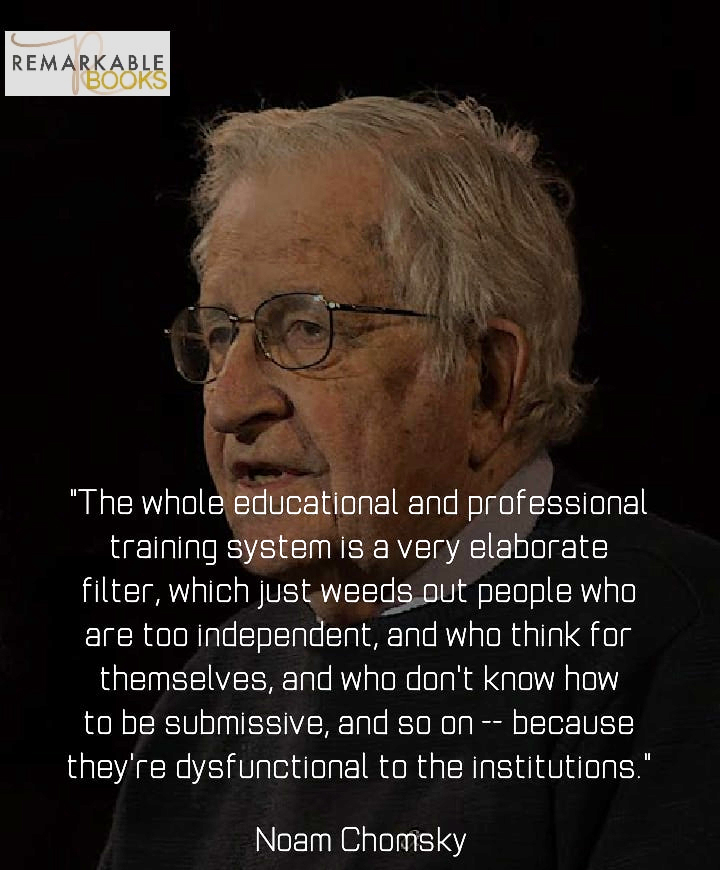 America was as inventive and productive as it was because of those exceptional independent thinkers. Those who could, DID, unfettered and free, in ways no other country would allow. They weren’t cogs in a machine, they broke the machines and made better ones. Many failed. Then they picked themselves up and tried again. Orville and Wilbur Wright with no formal college education taught themselves aeronautical engineering, built their own wind tunnel and designed the most efficient wing of its time. Then they used what they’d learned and built the first successful heavier-than-air powered aircraft – a feat the New York Times had authoritatively stated would take “one million to ten million years” to do, just before they did it. Sixty-five years later, humans landed on the moon. Fifty-two years after Apollo 17, we haven’t been back. Yes, the British Empire and the industrialists of the United States wanted and needed cogs with certain skills and attributes, but we also need artists, musicians, lawyers, doctors, engineers and statesmen. Those, the creators of our schools intended, wouldn’t come from public education. The children of the wealthy didn’t attend public schools, but rather private ones. Those private schools did teach music, art, languages, rhetoric, poetry, logic, etc. You see, the children coming out of these schools would be the leaders of the future – leaders of industry, members of governments, lawyers, doctors, scientists etc. They would be the intellectual class. England had a class system. The U.S. didn’t. (See my favorite joke on that topic.) But as Jordan Peterson likes to say, hierarchy is as natural to humans as it is to lobsters. We made our own. And we used Public Education to help, because, well: 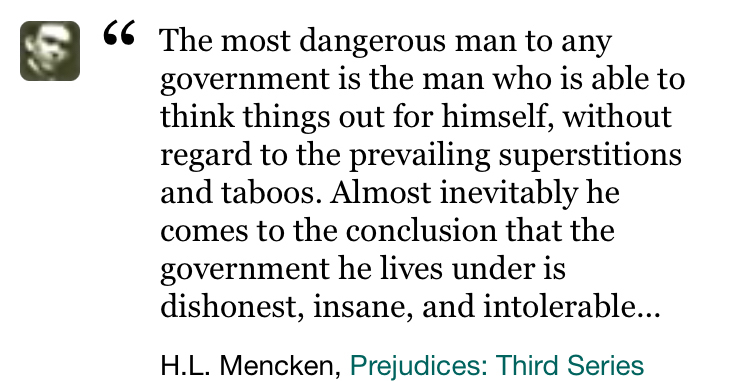 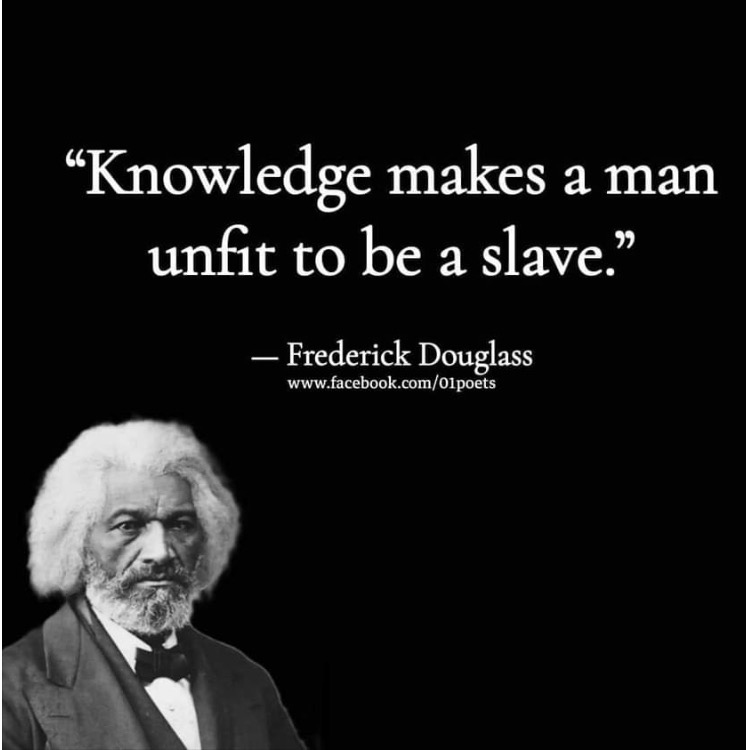
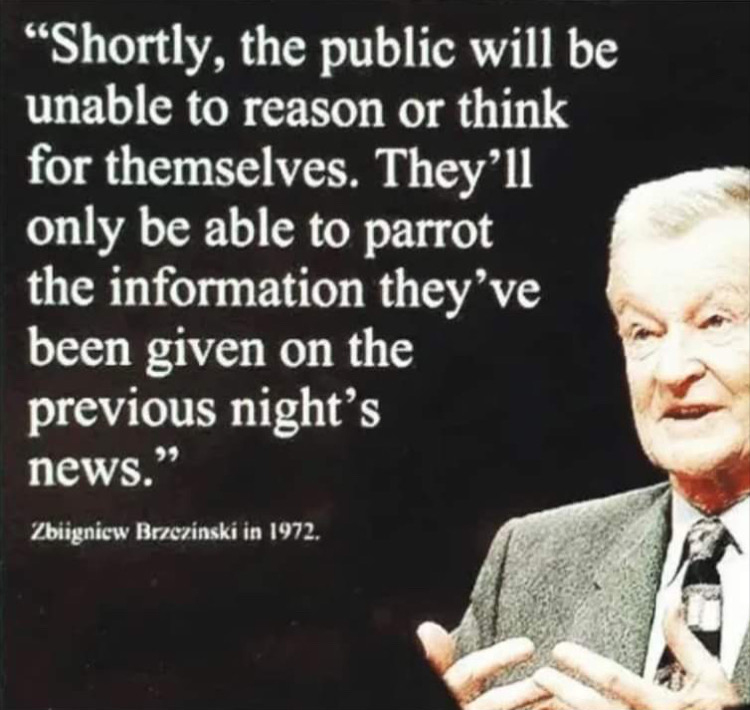 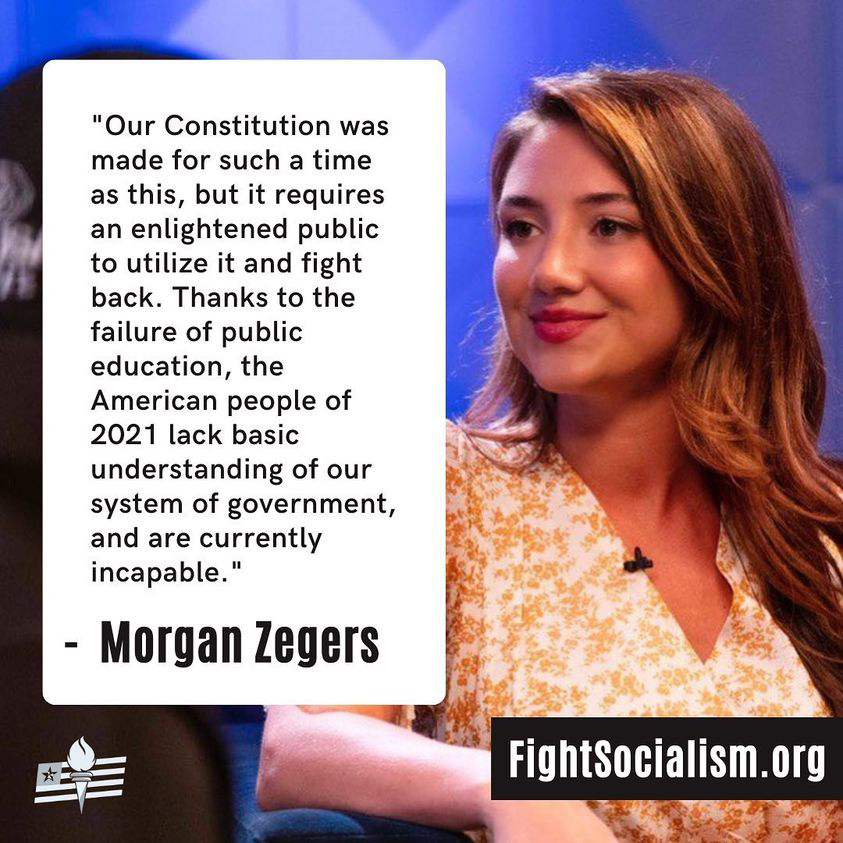 As Aristotle once said, “All who have meditated on the art of governing mankind have been convinced that the fate of empires depends on the education of youth.” Indeed it does. It’s the primary vector of control. 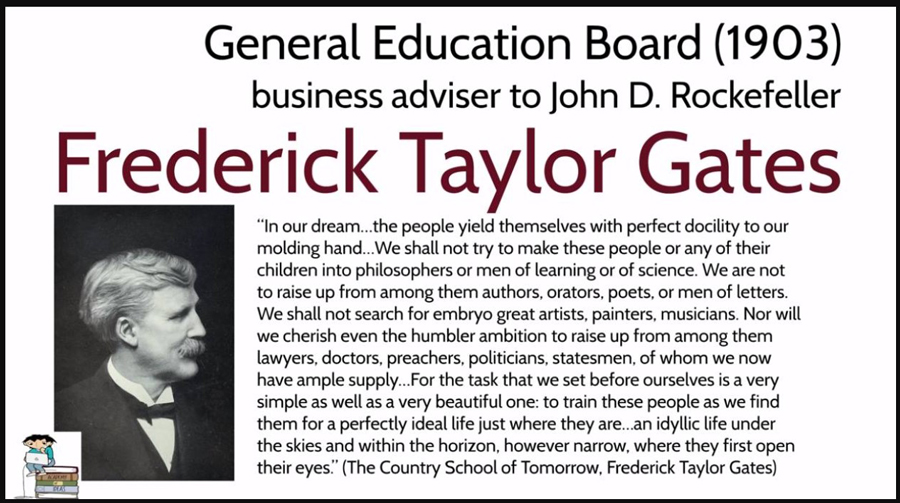 Rockefeller was an early and enthusiastic supporter of mandatory public education. Frederick Taylor Gates was one of his men, and served as the President of the General Education Board created by Rockefeller’s altruism. Yeah, altruism. That was it. The Robber Barons weren’t interested in anything but competent little cogs to work in their factories, buy their products, and do what they were told by their betters. As in the British Empire, our public schools would provide them. Education – the combination of knowledge, reason, and understanding – gives individuals power. By 2004 I hadn’t quite reached this understanding regarding the difference between education and schooling. Throughout history, the most common form of government has been the Oligarchy, whether that be Royal families, banking tycoons like the Medici, or the Hunnish Empire under Attila. I wrote about this in a roundabout way in Those Without Swords Can Still Die Upon Them, explaining how the technology of modern firearms was responsible for the rise of modern democratic governments over oligarchies. In that piece I concluded: So what do you do if you want to fetter a free people?
Which of these seems easiest, and how would it be best accomplished? And best resisted? Of course at that time I thought it was #3. Silly me. If you make them illiterate, you’ve severely limited #2, and made long strides towards #1. Obviously, those are easier. Human nature says most people who already have power don’t want to see theirs diminished. For them, power is always a zero-sum game. The ones who have grasped power don’t want to share, and they don’t like upcoming competition. What better way to limit competition than by metaphorically smothering it in the cradle? And how better to maintain control of the masses than by controlling their ability to think? 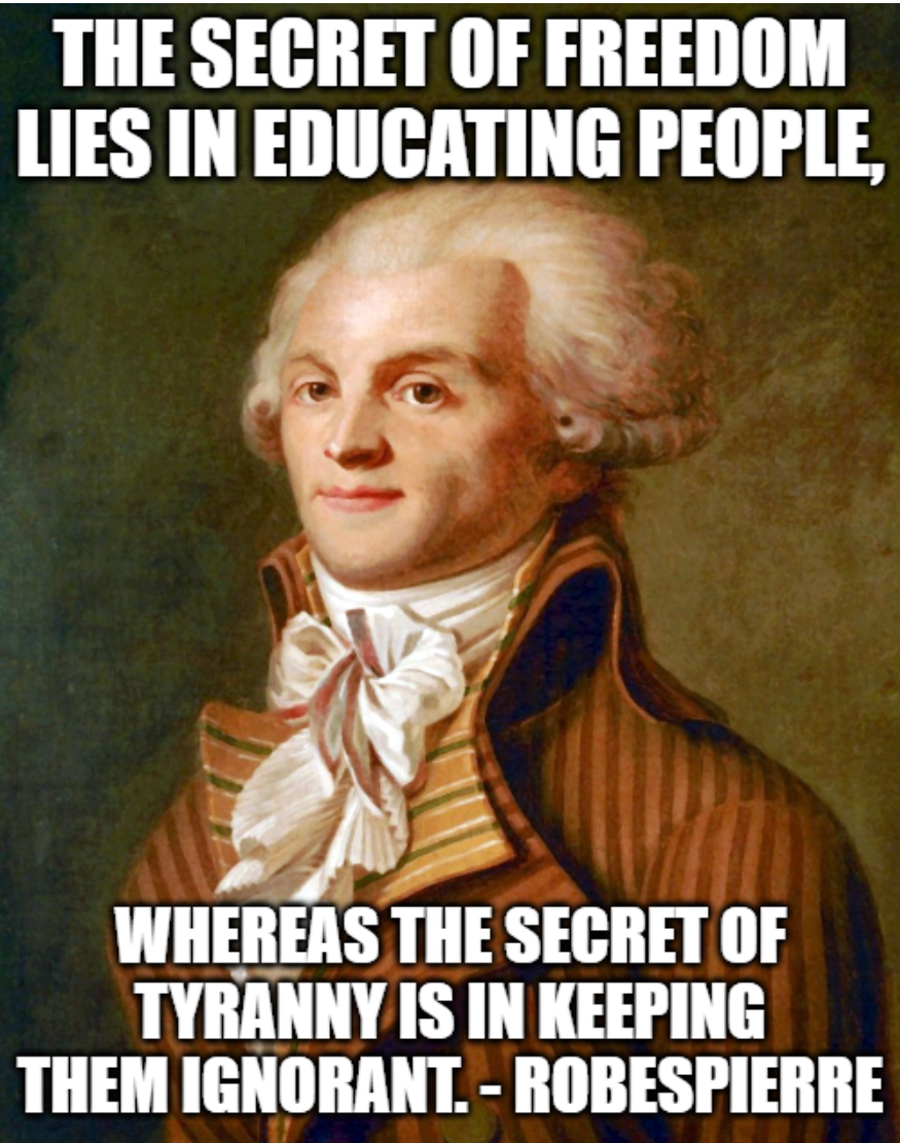 With the British system you get an elite, highly educated class, and a lower-tier class that’s still literate and numerate, but their knowledge is strictly limited, and they are trained to be obedient and to not question authority. John Ringo in one of his novels wrote what I call “Truth in Fiction,” where he uses a dramatic passage to explain a human truth. From his Road to Damascus (2005): (The party) is composed of two tiers. The lower tier produces many outspoken members who make their demands known to the upper tier. The lower tier is derived from the inner-city population that serves as the base of the party. The lower tier’s members are generally educated in public school systems and if they aspire to advanced training, they are educated in facilities provided by the state. This wing constitutes the majority of (the party’s) membership, but contributes little or nothing to party theory or platform. It votes the party line and is rewarded with cash payments, subsidized housing, subsidized education, and occasional preferential employment in government positions. The lower tier provides only a handful of clearly token individuals allowed to serve in high offices. Hyperbole? Thirteen high schools in Baltimore, Maryland, don’t have any students who are at grade-level proficiency in math. One of their high school seniors only passed three courses in four years and had a GPA of 0.13. Even worse? He ranks 62nd out of 120 in his class, meaning 58 students rank lower. Most California students fall short of grade-level standards in math and reading. In Detroit only 14.6% of students tested proficient in English, 9.0% in math, 8.2% in science and 4.2% in Social Studies. These are not outliers. So a system established to produce identical cogs that could read, write, and do arithmetic in their heads now fails at all three. It’s systemic. It’s deliberate. The question again is WHY? Because the cogs they needed didn’t need those skills. Our Empire was the Continental U.S. We had rail & telegraph. The number of people needed to manage a business (or a government) was reduced, but people able and willing to stand at an assembly line and do repetitive tasks? Why would they need to read, write and do mathematics? They just needed to be compliant and trainable. Children did it before compulsory schooling. The article referenced above regarding the Prussian system references a UC San Diego study. Its author, Augustina S. Paglayan says: My research reveals violence can heighten national elites’ anxiety about the masses’ moral character and the state’s ability to maintain social order. In this context, public education systems were created and expanded to teach obedience. (My emphasis.) They understood what Mencken and Douglass understood. But there was a further wrench introduced into the system. The British school system dates back, as Dr. Mitra says, about 300 years, to about the time they first started their empire. By Victoria’s time it was a finely-tuned machine. We started about 1900. Things here were in full swing by 1920 or so. This time frame corresponds with a new popular philosophy taking the world by storm – Progressivism. Progressivism is the philosophy Jeff Dege comments about at the top of this exceedingly long essay. (Progressivism’s) goals involved strengthening the national government and addressing people’s economic, social, and political demands. Progressives saw elements of American society that they wished to reform, especially ending the extreme concentration of wealth among the elite and the enormous economic and political power of big business. It was a well-intentioned and necessary movement, but as Reason Magazine likes to point out “What a Wonderful Idea! With the Best of Intentions! What Could Possibly Go Wrong?” Among other things, the Progressives were enthusiastic about the promise of eugenics, and Woodrow Wilson thought that the Constitution was outdated and limited how much and how fast he could change things. He was right, but he wanted to discard it, not amend it. He thought the President should be part of an oligarchy of the elite. Emmanuel Todd in his 2002 book After the Empire: The Breakdown of the American Order basically blames Progressivism on universal literacy, and post-secondary education: But what if democracy is merely the political superstructure of a particular cultural stage — simple mass literacy? In that case, continuing advances in teaching and learning at the secondary and postsecondary levels will necessarily upset democracy in the places where it first appeared. So education, especially secondary and post-secondary education among the wealthy class, made them recognize the inequality that existed, and the Gilded Age (1870-1890) and the years leading up to it were a time of great inequality. Karl Marx, who graduated from the University of Jena in 1841 with a Ph.D in philosophy was one such member of that wealthy class. He and Frederik Engels published The Communist Manifesto in 1848. It was, to say the least, a very influential work for the Progressives. The Amendment process for our Constitution is rigorous, yet in the short period between 1913 and 1920 four Amendments were added to the Constitution on the strength of the Progressive movement. Try that today. So many of the wealthy and well-educated were shocked and guilt-ridden at the inequality around them. They felt themselves superior to those outside their class, but wanted to ameliorate the situation. They wanted to help “The People.” But they didn’t want them to rebel against the system that made them rich. How to do that? EDUCATION!! Many people who went into teaching, and especially training teachers, weren’t as interested in Reading, Writing, and Arithmetic as they were with Changing the World™! They were what were referred to as “Agents of Change.” They wanted to make more Progressives. World War I following on the heels of the Gilded age and the Great Depression following the war just proved to them that they were right to do so. Now the cogs they produced would spread Progressivism! And some did, more with each passing generation. Why does the education establishment hate Home Schooling and Charter Schools? Because these remove children from indoctrination into Progressive ideology. They produce those independent thinkers Mencken and Douglass and Robespierre explained oppose tyranny. Those people threaten Good Order, the status quo. They don’t know their place. You get them from the public school systems, too, but they’re a tiny minority who escape it mostly unscathed. In 2010 Professor Angelo Codevilla, at the time American professor of International Relations at Boston University (PBUH) wrote a piece for the American Spectator, America’s Ruling Class – And the Perils of Revolution. It caused quite a stir. Rush Limbaugh read it in whole on his radio show. In that piece he discussed the difference between the Upper Tier and a third tier, what Ringo calls the “non-party members.” He called the Upper Tier the Ruling Class and the other the Country Class. The Country Class didn’t live in the cities, weren’t dependent on government for “cash payments, subsidized housing, subsidized education, and occasional preferential employment in government positions.” No, the Country Class pays for all that. The Country Class sends its children to state schools, too, though their educations are often better, for certain values of “better,” than the Lower Tier gets. The Country Class provides the tax dollars and their sons and daughters to man the military. The Country Class builds and maintains the infrastructure, grows and distributes food, produces and distributes power, makes the products, moves them, sells them, buys them, and buries them in landfills when they’re done. The Country Class is the cogs in the machine. The Ruling Class is managed by what I’ll call the Gentry Class – the Oligarchs. These people do influence party theory and platform, because they’re significant political donors, or high-ranking members of government, and especially, high ranking members and former members of the government’s intelligence apparatus. They control the corporations that control the media, real estate, basically every facet of life. They’re very different from the Country Class. Rasmussen reports that a recent study under the title “Them vs. U.S.” polled 1,000 of the “1%.” These are people you won’t see at a Trump rally. “The 1%” are defined by specific criteria:
What the survey found isn’t shocking if you’ve been paying attention, but if you haven’t, read on: Financial Well-being: Nearly three-quarters of the elites surveyed believe they are better off now financially than they were when Joe Biden entered the White House. Less than 20% of ordinary Americans feel the same way.
“OK, so what?” you ask. The attitudes of these people are the attitudes of your Oligarchs. The Oligarchs are a tiny subset of this group. These highly educated and very wealthy people believe themselves superior by dint of their wealth, education and power. Daniel Greenfield noted a long time ago: The cult of the left believes that it is engaged in a great apocalyptic battle with corporations and industrialists for the ownership of the unthinking masses. Its acolytes see themselves as the individuals who have been “liberated” to think for themselves. They make choices. You however are just a member of the unthinking masses. You are not really a person, but only respond to the agendas of your corporate overlords. If you eat too much, it’s because corporations make you eat. If you kill, it’s because corporations encourage you to buy guns. You are not an individual. You are a social problem. The Oligarchs have convinced themselves that their benevolent rule is “For the People.” We don’t know what’s best, they do. Here’s another “Truth in Fiction,” Sir Terry Pratchett from his Discworld novel Night Watch: Vimes had spent his life on the streets and had met decent men, and fools, and people who’d steal a penny from a blind beggar, and people who performed silent miracles or desperate crimes every day behind the grubby windows of little houses, but he’d never met The People. Thomas Sowell calls these people The Anointed. The “Self-” is implied. They want what’s best for “The People,” but as John Ringo points out, “Even the most cursory analysis of their actions and attitudes, however, indicates that they are not populists but, in fact, are strong antipopulists who actively despise their voting base.” And his evidence of that is that they, willingly and deliberately, destroy the educational system of the “lower tier.” Why the mass illegal immigration? The excuse is that they’re coming here for a better life, but the actual reason is because universal suffrage when the Country Class has a say puts a crimp in the power of the Oligarchs. They need those dependent voters to maintain the illusion of Democratic choice. A population that won’t do as it’s told scares the shit out of them. Do you understand now their visceral reaction to January 6? The People actually ROSE UP AGAINST THEM. How DARE THEY? They’ve used defamation (Racist, Nazi, homophobe, transphobe, etc. etc. ad infinitum). That didn’t work. They’ve tried lawfare, putting hundreds in jail trying to frighten the rest of us. That didn’t work. I’ve said that I believe that knowledge is power, but in another bit of “Truth in Fiction,” this scene from Game of Thrones puts the situation plainly: As all those memes go, Epstein didn’t kill himself, and no one has paid any price for his death. There have been many, many suspicious deaths of people who threatened the rich and powerful, deaths signed off as suicides or accidents. I have no doubt these people, being superior and all, have no qualms about killing to keep their power. Eggs, omelets, etc. They own the Department of Justice, whose leadership largely comes from those rich and powerful families, and they own our National Intelligence agencies whose leadership largely comes from those rich and powerful families. They own the media, whose leadership…. You get the rest. Knowledge is power, especially when it’s backed with deniable lethality. In 1826 Thomas Jefferson was invited to attend a 50th Anniversary celebration of the signing of the Declaration of Independence. He was too ill to travel, but wrote a gracious letter declining the invitation. Do read the whole thing, but in that letter was this passage: …the mass of mankind has not been born with saddles on their backs, nor a favored few booted and spurred, ready to ride them legitimately…. We need to remind the Ruling Class™ of this fact. Emphatically. Because they very much want to be back in the saddle again.
Kevin Williamson is the roving correspondent for National Review and co-host of the podcast Mad Dogs & Englishmen. |
Send this article to a friend:
 |
 |
 |